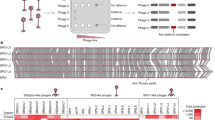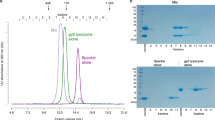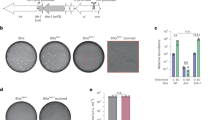Abstract
Bacteriophage T3 and T7 protect their DNA from restriction by producing, as the earliest detectable phage functions, anti-restriction proteins. Although the two phage proteins differ in their Chromatographic and antigenic properties, they act by the same mechanism: the anti-restriction proteins inhibit E. coli K12 restriction endonuclease by direct interaction.
This is a preview of subscription content, access via your institution
Access options
Subscribe to this journal
Receive 51 print issues and online access
$199.00 per year
only $3.90 per issue
Buy this article
- Purchase on Springer Link
- Instant access to full article PDF
Prices may be subject to local taxes which are calculated during checkout
Similar content being viewed by others
References
Arber, W. Prog. Nucleic Acid Res. molec. Biol. 14, 1–37 (1974).
Eskin, B., Lautenberger, J. A. & Linn, S. J. Virol. 11, 1020–1023 (1973).
Studier, F. W. & Movva, N. R. J. Virol. 19, 136–145 (1976).
Studier, F. W. J. molec. Biol. 94, 283–295 (1975).
Hirsch-Kauffmann, M., Pfennig-Yeh, M.-L., Ponta, H., Herrlich, P. & Schweiger, M. Molec. gen. Genet. 149, 243–249 (1976).
Spoerel, N. thesis, Berlin Free Univ.(1979).
Hausmann, R. J. Virol. 1, 57–63 (1967).
Sanger, F. et al. Nature 265, 687–695 (1977).
Sarabhai, A., Stretton, A. O. W. & Brenner, S. Nature 201, 13–17 (1964).
Spoerel, N. & Herrlich, P. Eur. J. Biochem. (in the press).
Spoerel, N. thesis, Berlin Free Univ. (1977).
Hadi, S. M., Bickle, T. A. & Yuan, R. J. biol. Chem. 250, 4159–4164 (1975).
Yuan, R., Bickle, T. A., Ebbers, W. & Brack, C. Nature 256, 556–560 (1975).
Bickle, T. A., Brack, C. & Yuan, R. Proc. natn. Acad. sci. U.S.A. 75, 3099–3103 (1978).
Yuan, R., Heywood, J. & Meselson, M. Nature new Biol. 240, 42–43 (1972).
Von Hippel, P. H., Revzin, A., Gross, C. A. & Wang, A. C. in Protein Ligand Interactions (eds Blauer, G. & Sind, H.) 270–285 (de Gruyter, Berlin, 1975).
Ponta, H. et al. Molec. gen. Genet. 149, 145–150 (1976).
Dussoix, D. & Arber, W. J. molec. Biol. 5, 37–49 (1962).
Toussaint, A. Virology 70, 17–27 (1976).
Zabeau, M., Friedman, S., Van Montagu, M. & Schell, J. Virology (in the press).
Herrlich, P. & Schweiger, M. J. Virol. 6, 750–753 (1970).
Livingston, D. M. Meth. Enzym. 34, 723–731 (1974).
Hjelm, H., Hjelm, K. & Sjöquist, J. FEBS Lett. 28, 73–76 (1972).
Author information
Authors and Affiliations
Rights and permissions
About this article
Cite this article
Spoerel, N., Herrlich, P. & Bickle, T. A novel bacteriophage defence mechanism: the anti-restriction protein. Nature 278, 30–34 (1979). https://doi.org/10.1038/278030a0
Received:
Accepted:
Published:
Issue Date:
DOI: https://doi.org/10.1038/278030a0
This article is cited by
-
Multiple mechanisms drive phage infection efficiency in nearly identical hosts
The ISME Journal (2018)
-
Complete genome sequence of bacteriophage vB_YenP_AP5 which infects Yersinia enterocoliticaof serotype O:3
Virology Journal (2014)
-
A protein linkage map of Escherichia coli bacteriophage T7
Nature Genetics (1996)
-
Counterselection of GATC sequences in enterobacteriophages by the components of the methyl-directed mismatch repair system
Journal of Molecular Evolution (1991)
-
In vitro template activity of 0.3 mRNA from wild type and initiation mutants of bacteriophage T7
Molecular and General Genetics MGG (1984)
Comments
By submitting a comment you agree to abide by our Terms and Community Guidelines. If you find something abusive or that does not comply with our terms or guidelines please flag it as inappropriate.



